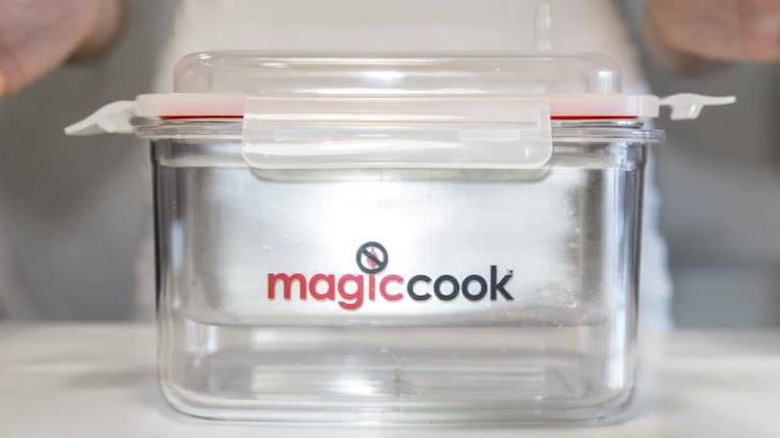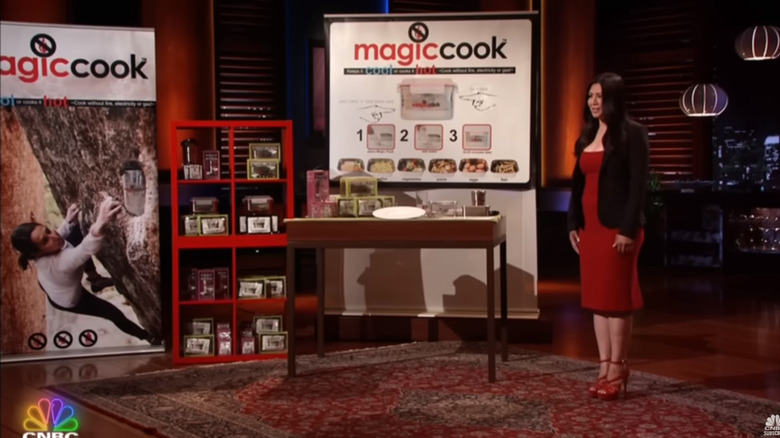Where Is The Magic Cook From Shark Tank Today?
When entrepreneur Sharon Yu showed up in 2014 to pitch her product on "Shark Tank," she may have counted a bit too much on the wow factor of her product. It is true that the idea of a cooking container that manages to provide you with a hot meal without electricity or fire — which is what her Magic Cook promised — seems to be, well, magic. But this didn't make it an easy sell to the sharks. In fact, regardless of how impressive the technology may be, Magic Cook has struggled to gain footing in the years since Yu's "Shark Tank" appearance.
Not a single shark could say they weren't impressed by what Yu showed them regarding the product. Again, without any fire or electrical power, Yu's Magic Cook could heat and reheat food. It did this through pouches of quicklime, a calcium oxide powder that can be used to create heat. The sharks certainly saw how many on-the-go eaters, particularly campers, might be attracted to a product like this, but not all of them were convinced that it would be easy to market, given that the Magic Cook's usefulness had to be demonstrated for prospective buyers to have their interest piqued. It may have been a convenient camping food hack, but most of the sharks were skeptical.
Magic Cook hasn't really taken off
In the end, Daymond John was the shark who bit. In return for a $100,000 investment, he received a 33% stake in Sharon Yu's company. This was more than the 20% she initially sought to grant in return for the investment, but it meant that Yu could walk away with a deal for financial backing to grow her Magic Cook. And for a while, it looked like the product would take off, like many others that are able to seal a deal on "Shark Tank." John himself even went on the Home Shopping Network to promote the Magic Cook in 2016.
About seven years later, Magic Cook's fortunes appear to be on the decline. The products only seem to be available through the Magic Cook Amazon page, and even then, it's just a single product, the Magic Cook cup, along with some refills of the quicklime pouches. The larger containers, such as the one Yu used during her demonstration, seem completely unavailable. The Magic Cook Facebook page has not been updated since 2018, and even the Magic Cook website appears to be down.
Did Yu steal the idea for Magic Cook?
Nor does Magic Cook appear to be doing well in the world of face-to-face retail. While, according to Yu, Magic Cook products had already been available in sports retail outlets even before her appearance on "Shark Tank," today, no brick-and-mortar retailers carry it.
Even more troubling for Magic Cook is the allegation that Sharon Yu's idea may not be her own. Barocook, a rival company whose food containers use the same quicklime chemical process for cooking food, has published a post accusing MagicCook — as well as one other company — of violating international copyright and suggests that "Shark Tank" discovered this fact after Daymond John and Yu shook on their deal. Barocook, meanwhile, seems to be thriving. According to its website, it is sold in outlets in more than 20 countries and offers several products. It also appears to have several products available for purchase through Amazon.
Though it is difficult to tell which side has a legitimate claim, the controversy over copyright infringement may explain why so few retailers carry the product today and why Magic Cook's profile seems to have shrunk. Stay tuned for an update on Magic Cook on an upcoming rerun of "Shark Tank."


